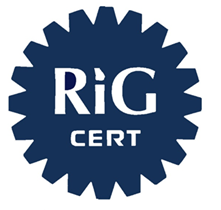ISO 50001 - Energy management

ISO 50001 is the world’s leading standard for energy management systems.
First published in 2011 and then revised in 2018, ISO 50001 helps organizations establish the systems and processes necessary to improve energy performance, including energy efficiency, energy use, and energy consumption.
The standard is aligned with globally recognized best practices in energy management. It promotes a structured, data-driven approach that supports continual improvement, compliance with energy-related legal requirements, and a reduction in energy costs and greenhouse gas emissions.
ISO 50001 is applicable to organizations of all types and sizes, regardless of industry or geographic location. It is widely adopted by manufacturing companies, service providers, public institutions, and other entities that seek to manage energy systematically, reduce environmental impact and enhance competitiveness.
RIGCERT provides accredited certification services for energy management systems in accordance with ISO 50001. Our certification process is impartial, transparent, and carried out by experienced professionals with a deep understanding of energy performance and your industry’s specific challenges.
Whether the goal is to lower energy bills, reduce carbon footprint, comply with regulations, or demonstrate energy responsibility to stakeholders, ISO 50001 certification with RIGCERT helps organizations drive meaningful improvement and long-term sustainability.
ISO 50001 is the international standard that establishes requirements for an Energy Management System (EnMS).
It is applicable to any organization, regardless of size, sector, or energy use profile. The requirements of ISO 50001 are generic and should be interpreted in the context of the organization's energy use and consumption patterns, applicable legal and regulatory obligations and operational realities.
Support from top management
A critical success factor for an effective Energy Management System (EnMS) is active leadership and support from top management. They are responsible for establishing an energy policy, setting relevant energy objectives and targets, promoting energy awareness throughout the organization, and ensuring that sufficient resources are available to implement and maintain the EnMS.
Key requirements of ISO 50001
Implementing an EnMS in line with ISO 50001 involves meeting specific requirements defined by the standard. One of the initial steps is determining and documenting the scope of the energy management system, clearly establishing its scope (boundaries and applicability of the energy management system).
Organizations must identify the energy sources they use, the significant energy uses (SEUs), and the factors that affect energy performance. A key requirement is conducting an energy review to evaluate current energy performance, identify opportunities for improvement, and set a baseline for measuring progress.
Energy performance indicators (EnPIs) must be established, along with energy objectives and targets that support continual improvement. These must be aligned with the organization's energy policy and supported by appropriate action plans.
As with other management system standards, ISO 50001 emphasizes risk-based thinking. Organizations must consider risks and opportunities that could influence energy performance and the intended outcomes of the EnMS.
Competence and awareness of personnel are also essential. Employees need to understand how their activities influence energy use and how they contribute to meeting the organization's energy goals.
Operational planning and control must ensure that energy performance is managed effectively across all relevant processes. This includes integrating energy performance considerations into design, procurement, and change management activities.
External providers—including contractors and suppliers—must be controlled where their activities or products impact the organization's energy performance. When actual energy performance deviates from expectations, the organization must address nonconformities and take appropriate corrective actions.
Monitoring, measurement, analysis, and evaluation are fundamental in ISO 50001. Organizations must track relevant data, evaluate compliance with energy-related legal and other requirements, and measure progress toward energy objectives. Internal audits must be conducted at planned intervals to ensure the EnMS is effective and conforms to ISO 50001.
Management reviews are required to assess the continued suitability, adequacy, and effectiveness of the EnMS and to ensure alignment with the organization’s strategic direction.
Continual improvement
At the core of ISO 50001 is the principle of continual improvement. The standard encourages organizations to systematically enhance their energy performance, optimize energy costs, support climate goals, and strengthen the overall energy management system over time.
The ISO 50001 Energy Management System (EnMS) certification is obtained following a successful certification audit, conducted in two stages by competent and impartial auditors.
The certification is valid for a period of three years, during which annual surveillance audits are performed to verify that the organization's EnMS continues to meet the requirements of the standard and that energy performance improvement efforts are maintained.
If surveillance audits are missed, or if they identify major nonconformities that the organization fails to address within the required timeframe, the certification may be suspended or even withdrawn.
At the end of the three-year certification cycle, the organization may opt for a recertification audit. This process is carried out under conditions similar to those of the initial certification and confirms the continued suitability and effectiveness of the energy management system.
We offer accredited certification for Energy Management Systems in accordance with ISO 50001. Our approach is tailored to the specific energy performance goals and operational realities of your organization, ensuring a certification process that is both relevant and effective.
Our accreditation by IAS - International Accreditation Service, guarantees that your ISO 50001 certificate is recognized and accepted by regulatory authorities, business partners, and other key stakeholders. IAS is a founding member of the IAF (International Accreditation Forum), which ensures that your certification benefits from global credibility and recognition.
With RIGCERT, you collaborate with a team of experienced professionals who understand the technical and strategic aspects of energy management and who are committed to delivering impartial, transparent, and results-oriented certification services.





